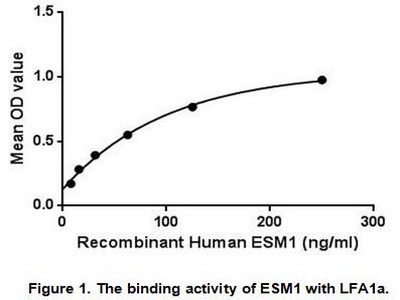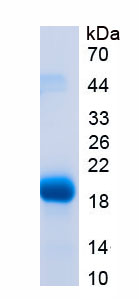Active Endothelial Cell Specific Molecule 1 (ESM1) 

Endocan
- UOM
- FOB US$ 310.00 US$ 775.00 US$ 1,550.00 US$ 4,650.00 US$ 11,625.00
- Quantity
Overview
Properties
- Product No.APC463Hu01
- Organism SpeciesHomo sapiens (Human) Same name, Different species.
- ApplicationsCell culture; Activity Assays.
Research use only - DownloadInstruction Manual
- CategoryMetabolic pathwayTumor immunityInfection immunityCardiovascular biology
- Buffer FormulationPBS, pH7.4, containing 0.01% SKL, 5% Trehalose.
- Traits Freeze-dried powder, Purity > 90%
- Isoelectric Point6.7
Sign into your account
Share a new citation as an author
Upload your experimental result
Review

Contact us
Please fill in the blank.
Activity test

Endothelial cell-specific molecule 1 (ESM1) is a proteoglycan secreted by endothelial cells (primarily in the human lung and kidney tissues) and its mRNA expression is regulated by inflammatory cytokines. Endocan expression, which detected in various epithelia and adipocytes has been shown to be upregulated by vascular endothelial growth factor (VEGF), fibroblast growth factor 2 (FGF-2), TNF alpha, IL1 beta, or lipopolysaccharide and downregulated by IFN gamma. Genetically engineered cells overexpressing ESM1 induce tumor formation, implying that ESM1 might be involved in the pathophysiology of tumor growth in vivo. Besides, Lymphocyte Function Associated Antigen 1 Alpha (LFA1a) has been identified as an interactor of ESM1, thus a binding ELISA assay was conducted to detect the interaction of recombinant human ESM1 and recombinant human LFA1a. Briefly, ESM1 were diluted serially in PBS, with 0.01% BSA (pH 7.4). Duplicate samples of 100uL were then transferred to LFA1a-coated microtiter wells and incubated for 2h at 37℃. Wells were washed with PBST and incubated for 1h with anti- ESM1 pAb, then aspirated and washed 3 times. After incubation with HRP labelled secondary antibody, wells were aspirated and washed 3 times. With the addition of substrate solution, wells were incubated 15-25 minutes at 37℃. Finally, add 50µL stop solution to the wells and read at 450nm immediately. The binding activity of of ESM1 and LFA1a was shown in Figure 1, and this effect was in a dose dependent manner.
Usage
Reconstitute in 10mM PBS (pH7.4) to a concentration of 0.1-1.0 mg/mL. Do not vortex.
Storage
Avoid repeated freeze/thaw cycles. Store at 2-8°C for one month. Aliquot and store at -80°C for 12 months.
Stability
The thermal stability is described by the loss rate. The loss rate was determined by accelerated thermal degradation test, that is, incubate the protein at 37°C for 48h, and no obvious degradation and precipitation were observed. The loss rate is less than 5% within the expiration date under appropriate storage condition.
Increment services
-
 BCA Protein Quantification Kit
BCA Protein Quantification Kit
-
 Molecular Mass Marker for Protein
Molecular Mass Marker for Protein
-
 Monoclonal Antibody Customized Service
Monoclonal Antibody Customized Service
-
 Polyclonal Antibody Customized Service
Polyclonal Antibody Customized Service
-
 Protein Activity Test Experiment Service
Protein Activity Test Experiment Service
-
 Electrophoretic Mobility Shift Assay (EMSA) Experiment Service
Electrophoretic Mobility Shift Assay (EMSA) Experiment Service
-
 Buffer
Buffer
-
 Lentivirus Packaging Experiment Service
Lentivirus Packaging Experiment Service
-
 Adenovirus Packaging Experiment Service
Adenovirus Packaging Experiment Service
-
 Real Time PCR Experimental Service
Real Time PCR Experimental Service
-
 Spike RBD Protein (S-RBD)
Spike RBD Protein (S-RBD)
-
 Protein G
Protein G
-
 Protein A
Protein A
Citations
- Detection on dynamic changes of endothelial cell specific molecule-1 in acute rejection after renal transplantationPubMed: 22608803
- Endocan is useful biomarker of survival and severity in sepsis.Pubmed: 24769132
- Endocan, a putative endothelial cell marker, is elevated in preeclampsia, decreased in acute pyelonephritis, and unchanged in other obstetrical syndromesPubmed:25211383
- Endocan is useful biomarker of survival and severity in sepsisPubmed:24769132
- Endocan Levels and Subclinical Atherosclerosis in Patients With Systemic Lupus ErythematosusPubMed: 26614790
- Assessment of subclinical cardiac damage in chronic plaque psoriasis patients: a case control studyJournal:-102
- Inhibition of endocan attenuates monocrotaline-induced connective tissue disease related pulmonary arterial hypertension.pubmed:27912147
- Diagnostic and prognostic values of endothelial-cell-specific molecule-1 with malignant pleural effusions in patients with non-small cell lung cancerpubmed:28514746
- Changes in Endocan Levels and Blood Coagulation in HIV InfectionDOI: 10.13005/bpj/1082
- A novel role of endocan in alleviating LPS-induced acute lung injuryPubmed:29627442
- Is the plasma endocan level a reliable predictor for the severity of erectile dysfunction?Pubmed:30054863
- Serum Level of Endothelial Cell-Specific Molecule-1 (ESM-1) as a New Potential Biomarker for Rheumatoid Arthritis Disease ActivityDoi: 10.2174/1874312901812010189
- Downregulation of ENDOCAN in myeloid leukemia cells inhibits proliferation and promotes apoptosis by suppressing nuclear factor‑κB activityPubmed: 30816462
- Endothelial biomarkers in the light of new sepsis definitionPubmed: 30920847
- Risk stratification and prognostic evaluation of endothelial cell‑specific molecule1, von Willebrand factor, and a disintegrin‑like and metalloprotease with …
- A novel marker relationship between carotid intima–media thickness and disease activity score-28 in patients with rheumatoid arthritis: human endothelial cell …Pubmed: 31655533
- Role of Ascitic Endocan Levels in the Diagnosis of Spontaneous Bacterial Peritonitis in Decompensated CirrhosisPubmed: 32364003
- Comparison of the maternal serum endocan levels in preterm premature rupture of membrane and normal pregnancy34109715
- The relationship between serum endocan levels with the presence of contrast-induced nephropathy in patients undergoing coronary angiography









